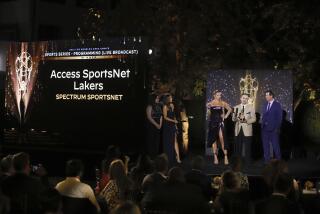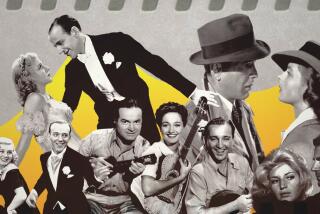The Death of Z Channel--What Now? : The History : Beset by troubles, quirky station will switch to all-sports
- Share via
When Henry Fonda rides off into the sunset at the end of “My Darlin’ Clementine” on Z Channel Thursday night, he’ll be taking a piece of Los Angeles TV history with him.
The eclectic Z Channel, programmed for film lovers of all stripes, is being shuttered in favor of an all-sports service from the new owners, New York-based Cablevision Systems Corp. and NBC.
The John Ford film, Z’s last telecast as Z Channel, is a sentimental farewell: The film was a favorite of Jerry Harvey, the passionate but troubled programmer who was the driving force behind Z.
The switch to SportsChannel Los Angeles is the final sad passage in what has been a tragic 15 months for Los Angeles’ beloved home-grown pay service. In April, 1988, Z abandoned its all-film format to include a sprinkling of local sports events. That same month (but apparently for unrelated reasons), Harvey shot and killed his wife and himself. In the following months, Z Channel lost a legal battle with Home Box Office and four motion picture studios over carrying advertising during its sports programming. The owners hoped the sports telecasts would broaden Z’s appeal enough to cover their $10-million investment.
Last March, they threw in the towel, selling Z to Cablevision, a cable company that operates six other regional cable sports services and SportsChannel America, a national programming service launched in January. Z’s fate was sealed.
The Z Channel was one of the oldest pay-TV services in the country. It was started by local cable system Theta Cable in 1974, but its heyday in the 1980s was sparked by the singular, sometimes quirky vision of Harvey, a screenwriter and film savant who guided the channel for eight years.
Where other pay services tread cautiously, banking on mainstream movies and middle-of-the-road entertainment, Harvey spurned the programming-by-committee approach.
He filled Z Channel with things he liked to watch: John Ford films, strange B movies, original versions of films that long ago had given way to edited versions. He broke every rule that other pay-TV programmers lived by. He ran silent films, he played black-and-white movies in prime time, he featured foreign films. He even ran turkeys and encouraged the audience to enjoy them for their camp value.
The formula worked. When Group W Cable, which bought Theta in 1980, offered Home Box Office, Showtime and The Movie Channel to its subscribers in 1982, Z Channel held on to its sizable market share, outselling the majors 3-to-1. When other services were plagued by disconnects, Z Channel’s audience remained steady and loyal.
Later that year, Harvey tweaked Hollywood and set the pay-TV business on its ear by telecasting director Michael Cimino’s original cut of “Heaven’s Gate,” the box-office disaster that United Artists had drastically shortened before its Los Angeles release. In a Christmas Eve showing, “Heaven’s Gate” became the most watched feature ever shown on Z Channel.
The other pay services sheepishly lined up to license the picture, but Harvey remained yards ahead of them. Over the next few years, he badgered, wheedled and nagged the studios to dig down into their vaults for lost films or the missing parts to films that had been torn apart in long-forgotten engagements in the war between directors and their studios.
Z Channel wasn’t programmed solely for the cinemaphile. There was an air of accessibility about the service that extended even to its most esoteric fare--an attitude fostered by the excellent critical film magazine that Z published each month.
Harvey and his staff packaged films in a way that set a standard for the industry. A slew of bad horror films would become the “Sweet Screams” series.
“We would do festivals just to celebrate someone we liked,” recalled F.X. Feeney, a Harvey cohort who wrote reviews for the magazine and acted as a special consultant to the channel.
The list of who Z Channel and Harvey liked was long and varied: actors (the service once ran a festival featuring the then-slim film portfolio of actress Phoebe Cates) and directors (another of Harvey’s rescue efforts was for Michael Cimino’s maligned 1987 film “Year of the Dragon,” which was featured on Z Channel magazine’s cover) and genres, including B movies so bad that the Z Channel reviews frankly panned them.
Other cable programmers admit that Z Channel influenced them but in the next breath point out that Z operated in the world’s film capital, which they maintain is more eclectic in its movie tastes than the rest of the country.
“It was wonderful, but it wasn’t always commercial,” said Lisa Mateas, director of program acquisitions for Turner Network Television.
Harvey always battled that perception. In an interview three years ago, in the midst of one of Z Channel’s many transitions, he said: “Do they think people don’t love movies in St. Louis, in Minneapolis? This thing would work anywhere there are film lovers.”
But by the mid-1980s, Z Channel was beginning to feel the crunch of competition. Subscribership dipped from more than 90,000 to about 85,000 as Group W put the marketing of Z Channel on the back burner and prepared to sell its cable systems. The consortium that next took control made it clear that Z would be unloaded as soon as a buyer was found.
Entrepreneur Gordon Rock eventually was persuaded to invest $4.5 million in Z Channel. For a while, things looked promising.
New executives were brought on board, but Harvey was given a long-term contract to continue programming Z the way he saw fit. There were plans to put Z on satellite to serve all of Southern California and even talk of creating a network of Z Channels across the country.
It never materialized.
Instead, in 1988, hoping to increase interest in the channel by dropping the all-movie format, Rock Associates and two new partners concluded a deal with the Dodgers, the Angels and the Clippers. Subscribership initially jumped to 110,000, but the deal was to have fatal consequences for Z.
To finance the $5-million sports package, Z needed to sell advertising during the games. The idea wasn’t without precedent. The Prism service in Philadelphia runs sports and movies and carries advertising.
Harvey’s violent death cast a pall on the service, but it was the failure to win a lawsuit against Home Box Office and four Hollywood movie studios that finished Z. The legal verdict prevented it from selling ads during its sports events--on the grounds that its contracts with the studios stipulated that the service be commercial-free--and put Z Channel on the sales block again.
Cablevision, seeing an opportunity to get its SportsChannel America service into the nation’s second largest market, grabbed it.
SportsChannel hopes its all-sports lineup eventually will push its subscribership to 2 million in Southern California, Arizona and Nevada. The plan may be working. After a marketing drive this spring, Z subscribership is up to 135,000 from the 85,000 that it had maintained for the past few years.
More to Read
The biggest entertainment stories
Get our big stories about Hollywood, film, television, music, arts, culture and more right in your inbox as soon as they publish.
You may occasionally receive promotional content from the Los Angeles Times.










